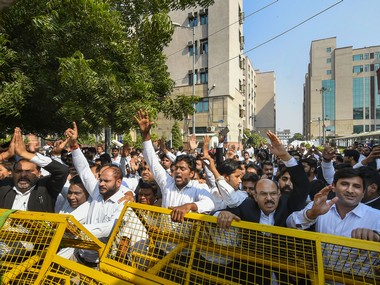In light of the recent incidents of hooliganism between lawyers and police in Delhi, it is only pertinent that there needs to be some analysis of the state of legal profession and education in the country. Legal profession across the globe is considered to be one of the most prestigious ones and is also called a noble profession. The same can’t be said about the state of affairs of the profession in India. India inherited the legal system from the British colonialists and adopted its Common Law system. The Common Law system is fundamentally based on tradition and is not textual, this fact is substantiated by the fact that Britain, even today, doesn’t have a written Constitution. Hence, their fundamental law, that is the Constitution, is exclusively based on tradition. [caption id=“attachment_7612501” align=“alignleft” width=“380”] Lawyers stage a protest against the police over the recent Tis Hazari Court clashes at Saket Court Complex in New Delhi. PTI[/caption] Such reliance on tradition presumes that the people follow and function within a framework of certain practices and customs, and everything shouldn’t necessarily be written down. This is something which is based on the British national ethos, and isn’t necessarily found everywhere else, not even in the US where, too, the Constitution is written. India has a written Constitution, but still, the framework of Common Law which the country follows relies on a lot of unwritten strictures, which are not to be found. This might be because of the fact that India relies a little too much on textualism, which is not a wrong thing per se. However, when there is an absence of a written rule, the officers of the court, which the lawyers are supposed to be, assume agency with respect to the law and think that it is easy for them to violate the rule of law and still get away with it because at the end of the day they are confident that they will find a loophole in the written rule, which will be their ticket to escape. The above can be regarded as a structural or a cultural issue which ails the profession in India. However, what is more problematic is an implementation problem at the education as well as the regulatory level. At the education level, the law schools in India are regulated to a level, which results in inefficiency. For instance, for any college to be set up which is to be associated with a government university, UGC norms are to be followed. This is something which all universities and colleges have to follow in India except for IITs and IIMs. How the exceptions are doing with relative to other educational institutions is for everyone to see. There is no institutional equivalent to IIT or an IIM in the field of law. Instead, law colleges have to follow additional regulations from the Bar Council of India. These being too tight, mostly result in red tape and breeds further inefficiency. Hence, at the education level, the legal profession suffers from over-regulation, which is an inherent roadblock to quality education. This, however, hasn’t stemmed the emergence of law colleges in every nook and corner of the country where the quality of legal education is very questionable. The law departments of most traditional universities in the country, especially in north India, are infamous for their hooliganism and are a hotbed of student politics. It is common knowledge that students, on a lot of occasions, enrol for a law degree merely to continue their student politics. Therefore, it shouldn’t be surprising that such hooliganism is then carried forward to the profession subsequently. At the university level, hence, strict examination guidelines are required to be implemented.
In developed jurisdictions, it is considered a privilege to get enrolled in a law school, and on most occasions, it requires paralegal training to make one even eligible to write the entrance exam. In India, getting admission into a law college, except for a few top ones, is easier than getting admission even in a primary school.
Secondly, quality control can also be achieved at the level of admittance to the bar too. This is where the Bar Council of India fails again. After much hue and cry, an All India Bar Examination was introduced for all the law graduates from 2009-10 onwards. This is something which has long been practised in foreign jurisdictions and is considered a very major achievement to clear the bar exam, in the USA, for instance. However, in India, the bar exam is a cruel joke. It hasn’t served any purpose, apart from minting money for the BCI, and its pass rate exceeding 60 percent on most occasions. If the bar examination is conducted strictly and graduating it is considered prestigious, it will act as an incentive to drive talented graduates to choose legal practice over corporate jobs, which is something most graduates of National Law Universities prefer over law practice.
The substandard quality of legal education is appropriately reflected in the legal profession, through these incidents. It also needs to be stressed that conflicts between lawyers and the police such as the ones in Delhi are not at all uncommon and happen routinely in smaller towns, these incidents got traction because they happened in the national capital.
Hence, the need of the hour is fixing the legal education and attaching it the same sanctity as it has in developed countries. This is something which can only be done, when the court, the bar and the legal academia come together and come out with some bold structural reforms as suggested above. The author is an assistant professor of law at Maharashtra National Law University in Mumbai


)

)
)
)
)
)
)
)
)



